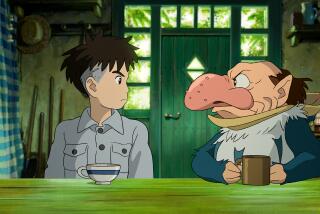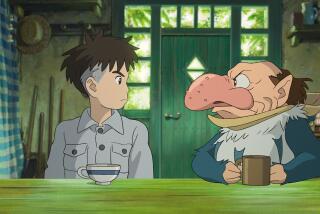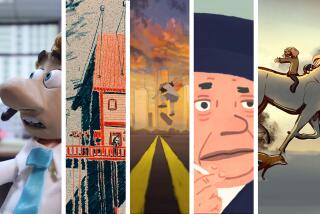Review: ‘Kahlil Gibran’s The Prophet’ an uneven mix
“Kahlil Gibran’s The Prophet,” an animated film based on the bestselling 1923 book of poetry, recalls the so-called package features that Walt Disney released in the 1940s: It’s a collection of visually diverse shorts loosely strung together.
As Gibran’s book has no plot, writer-director Roger Allers had to construct a story, turning some of the poems into speeches by imprisoned artist-poet Mustafa (voice by Liam Neeson).
In addition to inspiring the local villagers, Mustafa heals the frayed bond between his housekeeper, Kamila (Salma Hayek), and her daughter, Almitra (Quvenzhané Wallis). The relationship between the unfailingly noble Mustafa and Almitra forms the heart of the story, but she’s a problematic character. In the opening sequence, she wreaks havoc in the local market, much as the title character did in “Aladdin.” But Aladdin was a street-smart orphan who made his struggle for survival bearable by turning it into a game. Almitra has a loving mother and a home, and though her father may be dead, she doesn’t have to steal to eat. She appears to act out of malice, which makes it difficult to like her.
SIGN UP for the free Indie Focus movies newsletter >>
Allers brought together noted animators from around the world to illustrate the poems in often striking visual styles. Joan C. Gratz (“Mona Lisa Descending a Staircase”) uses streaks of clay to create a painterly vision of satisfying labor and harvests in “Work.” The elegantly elongated figures in “Love” by Tomm Moore echo the look of his Oscar-nominated feature “The Secret of Kells.” Simple black images of birds spattered with color by Michal Socha illustrate “Freedom,” while Nina Paley uses a style that suggests cutouts based on Hindu art for “Children.”
Less successful: The angular characters and awkward choreography in “Marriage” by Joann Sfar fail to convey the emotions of a couple in love. “Good and Evil” by Mohammed Saeed Harib boasts a handsome watercolor look, but the sequence borrows too obviously from “Bambi.”
The audience’s response to “The Prophet” is likely to be determined by their feelings for the original book rather than the eclectic, imaginative visuals. Readers who regard Gibran as source of profound wisdom will delight in this celebration of his work; skeptics who dismiss his poetry as portentous and overblown should wait for the disc to come out and enjoy the imagery with the sound on low.
------------
‘Kahlil Gibran’s the Prophet’
MPAA rating: PG for thematic elements, including violence, sensual images
Running time: 1 hour, 28 minutes
Playing: The Landmark, West L.A.
More to Read
Only good movies
Get the Indie Focus newsletter, Mark Olsen's weekly guide to the world of cinema.
You may occasionally receive promotional content from the Los Angeles Times.










